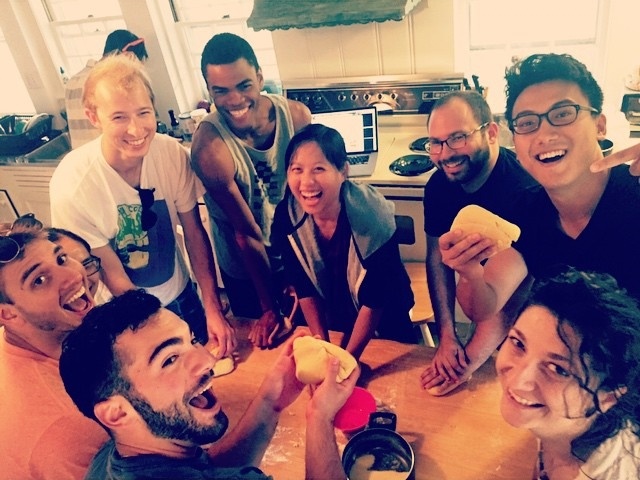 There are three key ingredients that go into creating a remarkable product culture. The first is ensuring that every person on your development team has an exciting and challenging mission. Then you need to give them the tools, resources, and autonomy to be successful in their mission. The third piece, and arguably the most challenging, is surrounding employees with high-wattage people who they can learn from and bond with.
There are three key ingredients that go into creating a remarkable product culture. The first is ensuring that every person on your development team has an exciting and challenging mission. Then you need to give them the tools, resources, and autonomy to be successful in their mission. The third piece, and arguably the most challenging, is surrounding employees with high-wattage people who they can learn from and bond with.
Building those relationships is important from a professional perspective because people learn new skills and strategies from one another. But these relationships are personal, too. Employees are happier at work when they can laugh with and confide in their co-workers. These are the relationships that will last long after employees leave a company.
We realized we had work to do on this third piece not too long ago when a relatively new hire said they were feeling unengaged at work because they had hardly interacted with anyone (aside from asking their direct teammates for help) since they had started at HubSpot. Here was a great new hire surrounded by great people, given great tools and a great mission yet they didn’t feel connected to the company or their team at all. That sucks.
It turns out that living in a world where you have headphones on and are spending most of your day focused on a screen is fantastic for building product, but not for building that social network. Fortunately, we were able to work with this individual and help them meet more people across the organization. But since then we’ve been talking a lot about how we can ensure that folks, particularly new hires, have the opportunity to form those relationships.
People have different styles of getting to know one another and engaging in company culture. That’s why taking a passive approach of just putting people together isn't good enough. As leaders and managers, our job is to create different forums that have different flavors so that everyone within the organization has the right opportunity to meet new faces. To do a better job, we’re keeping what we’ve learned so far top of mind:
Size Matters: Our co-founder and CTO Dharmesh Shah is a self-proclaimed introvert. He frequently jokes that big parties and crowded events are his worst nightmares. And he’s not alone. Socializing in big groups is stressful for a lot of employees. There should be opportunities for them to get past small talk with their co-workers that are more their speed. One way we’ve made this happen is by hosting ‘Meet and Eats’ where folks from different development teams get to go to lunch together in groups of about 4 or 5. The groups are small but varied (they might include engineers, designers, product managers, co-ops, tech leads, or VPs) creating a low-pressure way for employees to get to know product people outside their small teams.
Liquid Courage is Overrated: There’s nothing wrong with having office happy hours, celebrating a product launch over drinks, or grabbing beers with your team on Friday afternoon. HubSpot’s no stranger to any of those activities. But when socializing becomes synonymous with drinking, there’s a problem. Not everyone drinks and not everyone wants to drink on, say, a Tuesday or Wednesday. We’ve realized that revolving team outings around cocktails or the beer fridge unnecessarily puts those employees in an awkward position. Even a well-intentioned “Why aren’t you drinking?” can make someone feel uncomfortable. It pays to get a little creative and plan an activity that everyone can look forward to.
Employees Know Best: We don’t have a prescriptive development process or tell our engineers how to build product. We just give them the tools and autonomy to make it happen. And sometimes that’s the best way to create meaningful social opportunities for your team. Earlier this year, we were debating whether or not to rent a house on Cape Cod over the summer for our engineering team. (We did this in 2014 and affectionately dubbed the week Cape Code.) We wondered: Is this a vacation? Is this a working vacation? Why do we do this and what should the expectations be of the team? We concluded that our job was not to declare rules or enforce policies. It was to create a promising opportunity and let employees use good judgement.
So we rented the house for a week and the team roasted a lamb, played lawn games, got some work done, and cooked homemade pasta (see the action shot above) all of their own accord. The feedback we got afterward suggested that Cape Code put new hires on a fast track to getting integrated into the team and was the best thing we could have done for those social connections.
We didn't know that the Cape Code would spark the level of engagement and camaraderie that it did. And we might realize tomorrow that 'Meet and Eats' aren't the best, scalable solution for smaller group outings, or that there's more interest in kid-friendly events than we had originally thought. We're learning as we go but what we've discovered for certain is that team bonding has to be a priority. When leadership is thoughtful about it, everyone (from newbies to veterans, and from introverts to outgoing leaders) has the chance to build those important relationships.
What's been the best way for your to get to know your co-workers? Tell us in the comments below. Oh, and by the way, we're hiring.
